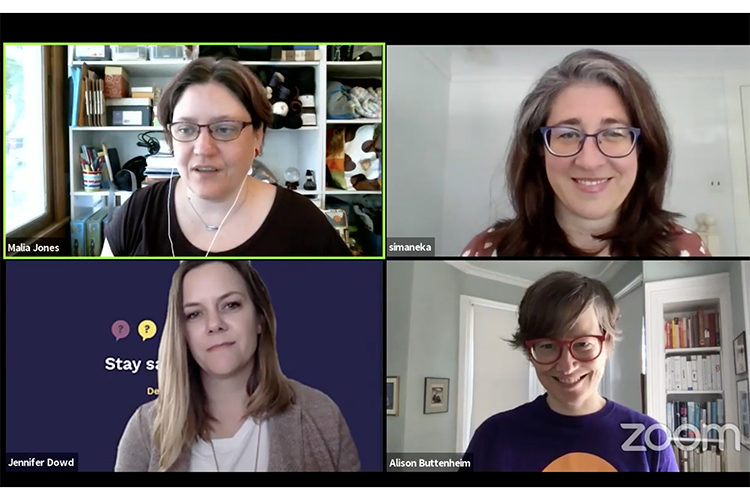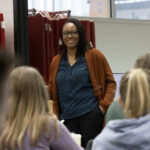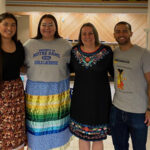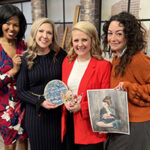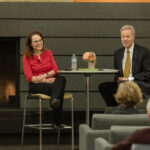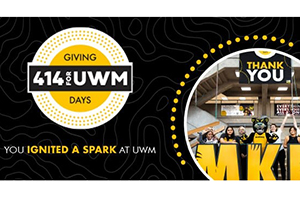Last March had barely begun when Amanda Simanek was being bombarded with questions about COVID-19 from friends and family.
Questions like, “I don’t have a fever so I’m not infected, right?” “Do I have to wear a mask outdoors?” “Are kids at risk or not?”
Simanek, an epidemiologist in UWM’s Zilber School of Public Health, has devoted much of the last eight months to ensuring that people have the right information to protect themselves and others against COVID-19. At issue is the fact that the disease can be transmitted to others by infected people who have no symptoms and don’t know they’re infected. So public health officials have focused on getting everyone to change their behaviors and habits.
It hasn’t been easy against a growing volume of conflicting advice – much of it propagating through social media. So, when she was invited by academic colleagues to join an initiative called Dear Pandemic, Simanek was all in.
Harnessing social media
Dear Pandemic is a social media-based campaign providing comprehensive, unbiased and science-based information about COVID-19, delivered in easily digestible question-and-answer nuggets. The group was launched in March by an all-female, interdisciplinary group of population health scientists to help battle the flood of information, both accurate and inaccurate, about the pandemic.
“By communicating on these channels, we’re sort of beating the spread of misinformation on social media at its own game,” Simanek said. Answers provided by the group can be repeated, shared and boosted in ways that no other method can provide, and analytics give the members an idea of their reach, she said.
Dear Pandemic now has over 40,000 followers on Facebook, 4,500 on Twitter and 5,800 on Instagram. Recently, they launched a website where you can search all their past posts, totaling to more than well over 500 questions answered.
“The average person cannot devote the time needed to navigate the onslaught of new COVID-19-related information,” Simanek said. “And if you can’t disentangle it or discern what’s true, you might just disregard all of it or else get swept into conspiracy theories.”
‘Those Nerdy Girls’
Collectively, Dear Pandemic’s members, who call themselves “Those Nerdy Girls,” have expertise in the fields of nursing, mental health, demography, health policy/economics and epidemiology. Though they came together organically, said Simanek, one goal was to elevate the voices of women with expertise in the national conversation.
With such breadth, “Those Nerdy Girls” can take on a wide range of topics, providing everything from how herd immunity works to how death data is collected. The latter helped them debunk the myth that COVID-19 deaths were among mostly people who were going to die soon, pandemic or not.
As summer began, many of the questions posed had to do with how to minimize risks while returning to cherished activities. So, the group adopted a handy acronym to sum up their “harm reduction” tips: #SMART, which stands for “Space (distance) Masks (yes), Air (ventilation), Restrict (group numbers), and Time (length of exposure).”
Media voices
At the same time that they are running Dear Pandemic, many of the group members, including Simanek, also are helping journalists get the facts right in their reporting.
In May, the Milwaukee Journal Sentinel began running a column that features a panel of university experts who answer reader questions. When reporter John Diedrich contacted Simanek about participating, she told him about the Dear Pandemic team because they were engaged in a similar effort.
“Once we learned about that,” Diedrich said, “We figured this was a good way to cross-reference the columns and use some of the same material from Dear Pandemic in our Journal Sentinel Q&A.”
“Those Nerdy Girls” have developed a reputation that now attracts national media outlets. In August, Simanek was invited to be a guest on NBC News’ “Global Hangout” with professors from Johns Hopkins University and the University of Edinburgh to talk about face masks. In her own household, Simanek shared, she keeps a large basket of masks by the door to help make the new habit easier for her family.
By early October, the number of COVID-19-related media appearances the group has done galloped past 200 – a healthy slice of them racked up by Simanek, who’s been quoted in outlets such as Newsweek, the Wall Street Journal and Huffington Post, in addition to a slew of local and state TV, radio and print media.
What about the holidays?
Recently, the group is getting questions about navigating the Thanksgiving and end-of-year holidays as people are forced to move activities back indoors. In addition to adhering to the #SMART principles, Simanek said, the first step people should take is to get a seasonal flu shot.
“If enough people in the population get a flu vaccine,” she said, “then our burden of flu will be lower, which will make it easier to deal with the burden of COVID-19 in hospitals.”
The Dear Pandemic group recently received funding from the Robert F. and Jean E. Holtz Center at UW-Madison to provide their content in Spanish, and the group launched a mirror Spanish-language Facebook site, Querida Pandemia.
The importance of robust science communication has been the biggest surprise of her experience with the COVID-19 pandemic, Simanek said. Ultimately, however, the real value of launching the Dear Pandemic project may be as a “dry run” for the future.
“Hopefully, we are all learning lessons now,” she said, “about how to be better prepared to respond to the next global pandemic that will inevitably emerge.”
In addition to Simanek, “Those Nerdy Girls” include:
- Malia Jones (co-founder), UW-Madison
- Alison Buttenheim (co-founder), University of Pennsylvania
- Ashley Ritter, University of Pennsylvania
- Jennifer Beam Dowd, University of Oxford
- Lauren Hale, Stony Brook University
- Sandra Albrecht, Columbia University
- Aparna Kumar, Thomas Jefferson University
- Lindsey Leininger, Dartmouth College
- Shoshana Aronowitz, University of Pennsylvania
